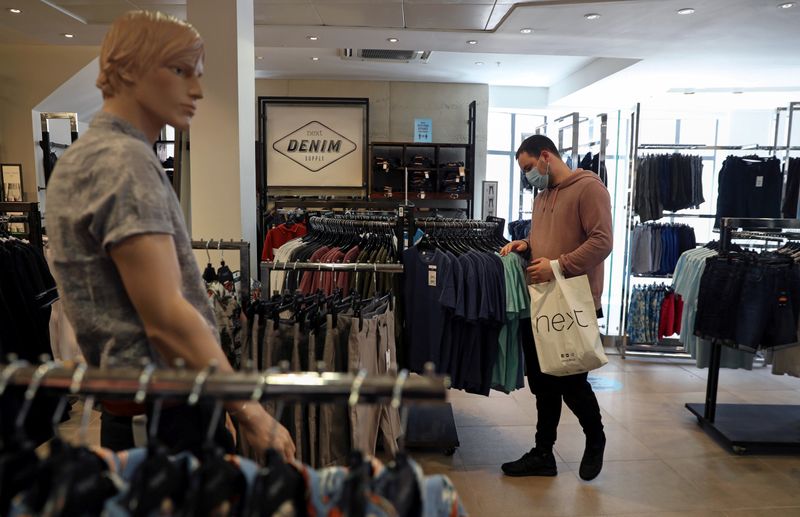By David Milliken, Andy Bruce and William Schomberg
LONDON (Reuters) - Britain's economic recovery from the shock of the COVID-19 pandemic has gathered pace, data showed on Friday, but government borrowing rose past the 2 trillion pound ($2.6 trillion) mark and fears of future job losses are mounting.
Retail sales rose above pre-pandemic levels in July, the first full month for many shops reopening after lockdown, and August's Purchasing Managers' Index (PMI) data showed the fastest growth in almost seven years.
But Britain's economy still faces a long recovery after shrinking by a record 20% in the second quarter, the largest decline of any big country.
"The UK is still seeing a V-shape bounce in activity. But ... a hot summer can quickly turn to a cold autumn," HSBC economist Liz Martins said, pointing to a softening in euro zone business activity as coronavirus cases begin to rise again.
Retail sales in July were 1.4% above year-ago levels and 3.0% above their level before the pandemic, the Office for National Statistics said.
August's preliminary composite PMI, which covers most businesses outside retail, hit its highest level since October 2013.
But employers are increasingly planning to shed jobs and were making staff redundant rather than bringing them back from a government-subsidised furlough scheme that expires in October.
"Scarring from the pandemic and lingering doubts about the sustainability of recovery resulted in a need to cut overheads," said Tim Moore, economics director at IHS Markit, which compiles the PMIs.
The Bank of England forecasts unemployment will reach 7.5% by year-end, almost double its most recent reading.
Separately, the Confederation of British Industry said manufacturing orders were "severely depressed", with little improvement in August.
Stuttering PMI surveys for the euro zone -- where countries exited lockdown earlier than Britain -- suggested the boost from pent-up demand was already fading.
JOB LOSSES
Retail sales are only part of overall household spending. A GfK survey showed no improvement in consumer confidence since early July.
Within retail, different businesses have had contrasting fortunes. Grocery sales are 3% up on the year and online sales are 50% higher than before the pandemic. But sales volumes at clothing and footwear stores are 25% lower than last year.
Stores including Marks & Spencer, Boots and John Lewis [JLPLC.UL] have announced plans for major job cuts.
Friday's data also laid bare the impact of increased public spending and a slide in tax revenues on the public finances.
Public sector net debt exceeded 2 trillion pounds in July for the first time, and is its highest since 1961 as a share of gross domestic product.
Government borrowing so far this financial year is 150.5 billion pounds, almost seven times higher than in the same period in 2019 though below the 178.8 billion pounds Britain's budget forecasters predicted last month.
The government has spent more than 35 billion pounds so far on its job support scheme, the largest single measure to tackle the economic impact of the pandemic.
Government figures showed 6.8 million jobs were furloughed at the end of June, down from 8.9 million in early May.
($1 = 0.7579 pounds)
